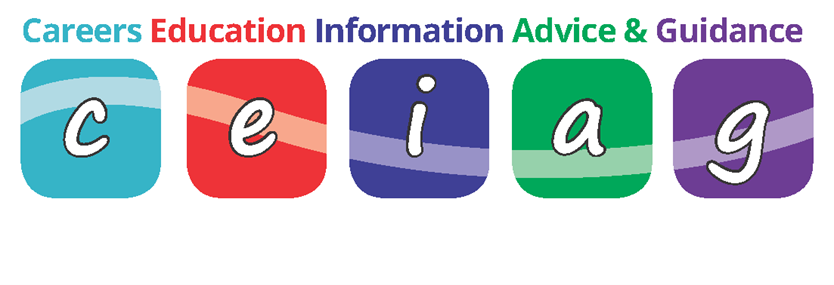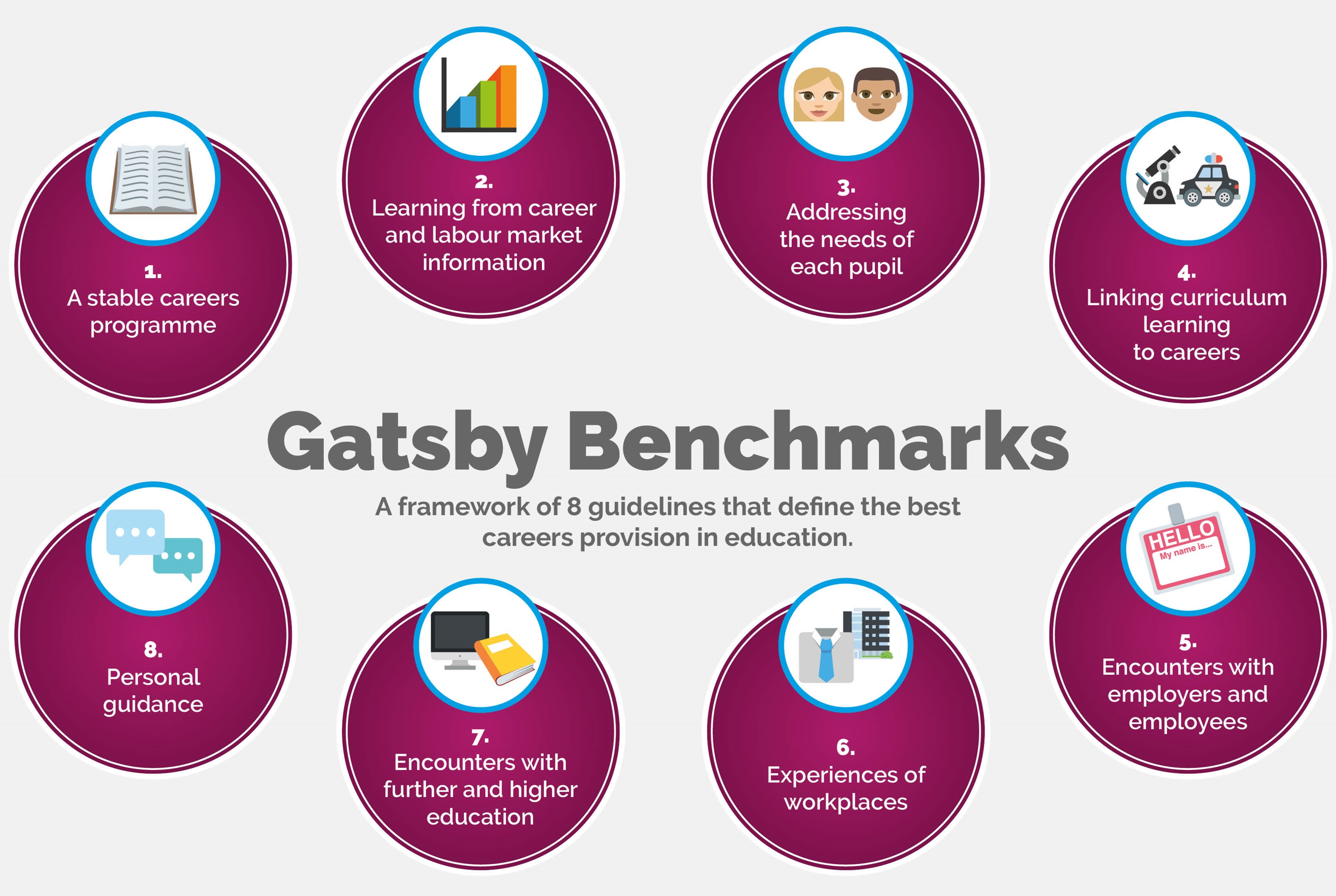
We have a planned careers curriculum. Careers education became a statutory requirement in January 2018 and we have worked to ensure we have a wide variety of opportunities both in and out of school to help us to prepare all our young people for their future working lives.
To help us with our planning we follow a set of core guidelines called The Gatsby Benchmarks. These are 8 key areas that contribute to effective careers provision. Each term we complete an evaluation using a system called ‘Compass’ this allows us to rate our provision against each benchmark and indicates what our focus needs to be. Our aim is for 100% in all 8 benchmarks!

Here are the Gatsby Benchmarks
1. A stable careers programme
The staff that deliver this programme are supported with well-planned and fully resourced careers lessons and also receive some CPD to support their delivery.
This programme includes key elements designed to help the pupils to explore and find out all about careers they are interested in as well as address key issues which are important when looking at careers such as stereotyping, social media and important work related skills. Information about future study options and the labour market is available to students at Careers Events, through taster sessions that we hold for pupils, some in school and others at local post 16 providers, and through independent careers advice from our Careers and Employability Manager who is qualified to give impartial advice on careers and future opportunities.
To identify pupils’ guidance needs, we ask them to complete a brief questionnaire at the beginning of the Academic Year, with their interests and future career path ideas on. This information is then collated and helps us can target particular pupils for specific events that may be of interest to them and their future career path.
We provide a wide range of opportunities for pupils to have direct contact with employers whether it is visitors to an assembly or specific career related activities in school or out at a place of work.
In addition to those already mentioned; a number of pupils are involved in programmes designed to open the access to university. ‘ThinkHigher’ is established in our school and we support several visits to local universities throughout the school year.
2. Learning from career and labour market information
To identify the needs of our pupils in regards to careers guidance, we encourage and document attendance to appointments. Every Year 11 pupil has at least one interview with our Careers Advisers and receives an agreed action plan to support their career planning.
Pupils can access Careers Advisers by using a number of methods – pupils or parents/carers can request appointments, teachers can refer them. To remain impartial, we ensure that our Careers Advisers arranges appointments with all of the pupils who are unsure of their future path.
Labour Market Information is also used throughout our careers programme, LMIs poster are displayed around our schools and on our website
3. Addressing the needs of each pupil
To address the needs of our pupils, we complete our Activity Tracker which allows us to track the encounters with employers over a school year. This tracking can also allow us to add information to a pupils’ area so we can target support and opportunities. We are keen to be inclusive and support pupils of all abilities and interests. For this reason we look at intended destinations appropriate to each individual and support access to appropriate post 16 choices so the transition from school is as supported and smooth as possible.
4. Linking curriculum learning to careers
To ensure that careers are incorporated into the curriculum learning of pupils we have worked with all our subject staff encouraging them to promote work ready skills as part of their everyday teaching. We want our pupils to see that alongside their academic studies we are developing their work ready skills to support a successful start at work. We have subject specific displays around the school sites which show the pupils how the curriculum they are studying can link to future jobs ad careers. All staff have had CPD training on careers to help them know and understand the role they play in raising aspirations linked to careers.
5. Encounters with employers and employees
Our pupils have a range of planned encounters with employers and employees. We document all of the encounters that the pupils have, so that we can target pupils who may not have engaged in any activities and events. These encounters take place in school through organised events like Careers Events or practice interviews or at a place of work such as the MIRA Technology Institute or at the local George Eliot Hospital. We invite parents to be involved if they can offer a visit to a work place and also involve them in feedback on events so we can continually improve our offer.
6. Experiences of workplaces
Some pupils may get the opportunity for a formal work experience and we encourage all pupils to look for holiday placements through connections they may have through family and friends. Our programme often involves a visit to a work place and we have taken advantage of promoting many ‘virtual’ work experiences on offer to pupils who have an interest in a career sector. We take advantage of opportunities such as the Warwickshire World of Work where a number of Year 10 pupils from all our schools received a programme of information and ‘hands on’ activities in a work place and had the opportunity to ‘meet the boss’.
7. Encounters with further and higher education
The Academy invites a range of education and training providers in to talk to students about approved technical education qualifications or apprenticeships. The providers will discuss with pupils a number of apprenticeships in a vast amount of sectors and industries. North Warwickshire and South Leicestershire College support us by providing several opportunities throughout the year to visit different sectors and gain up to date information on many Post 16 options.
All our pupils and their parents from Year 7-11 have the opportunity to attend career events. Representatives from local businesses, apprenticeship and training providers alongside further and higher education providers attend to discuss future career paths.
We believe raising aspirations starts as early as possible and plan visits to local universities to open up possibilities to our Year 7 pupils who may not have considered this route. These visits involve a campus tour and activities to help break down the barriers that may prevent a pupil from considering this option. A number of targeted pupils take part in the ‘Think Higher’ programme which allows them mentoring support and works with families to show this route as a viable choice for some pupils.
8. Personal guidance
Our Careers Advisers are Level 6 qualified and provide independent advice and guidance, are members of the CDI and follow their code of ethics. This work takes place in our school and provides one to one appointments, group session working closely with parents to support and help raise aspirations. Our school have their own bespoke Careers bases which have a corporate identity and are used weekly. The Careers and Employability Manager spends time every week in our school seeing pupils on an appointment system as well as pupils who may self-refer or be referred by staff.
The Gatsby benchmarks are under continual review and are monitored each half term through the use of Compass. This helps us to see where we are and identify what we need to do to improve each benchmark even further. We work closely with our Enterprise Coordinators and local career Hubs to improve our careers programme and offer to pupils.


